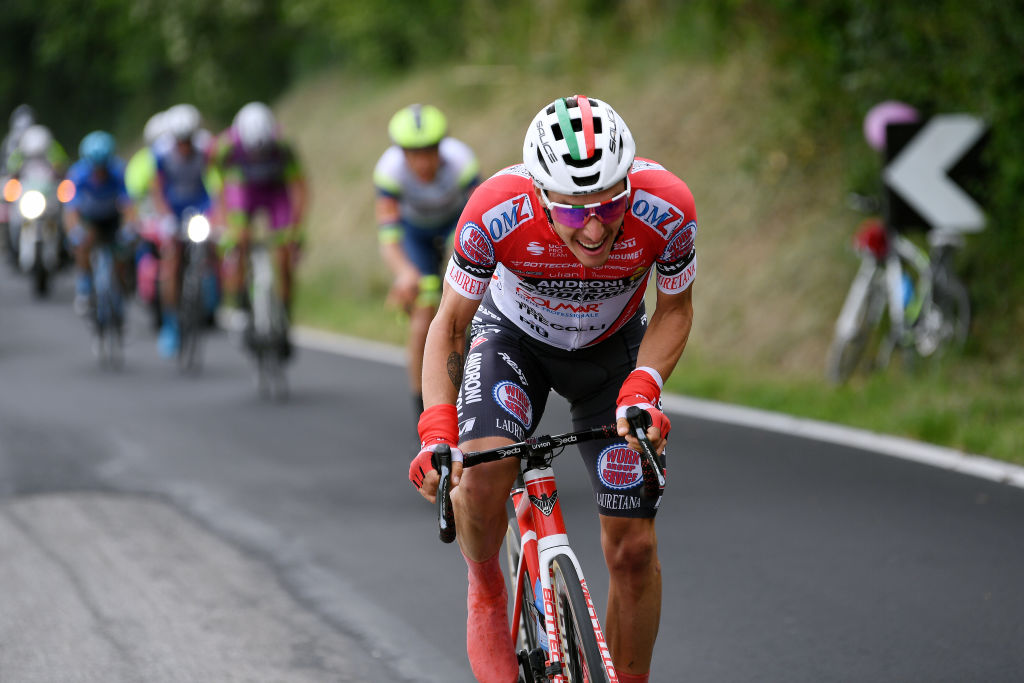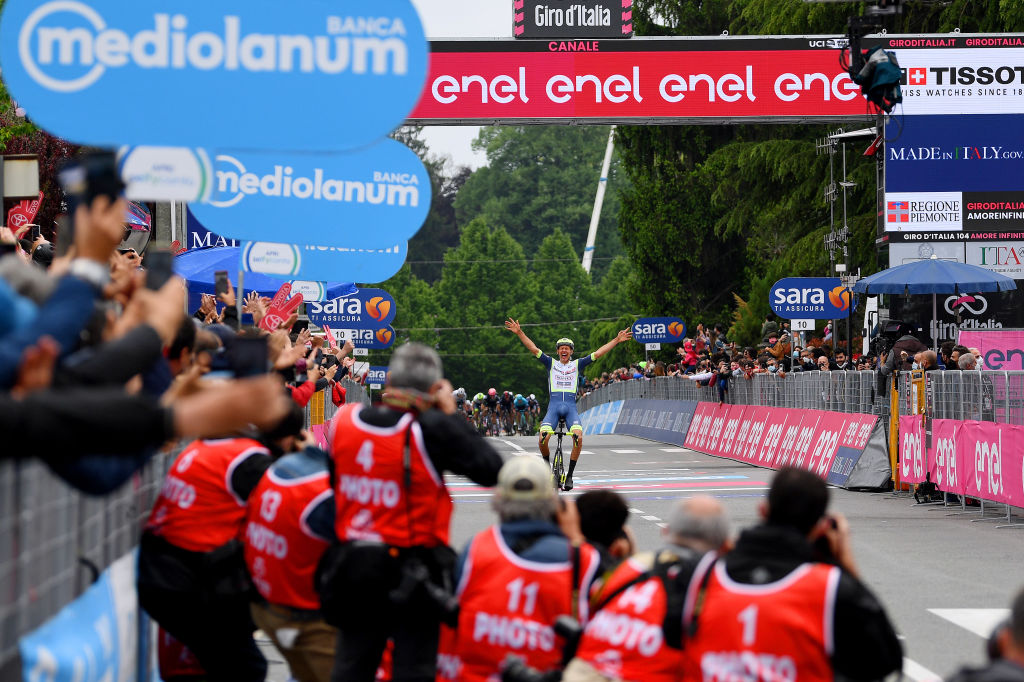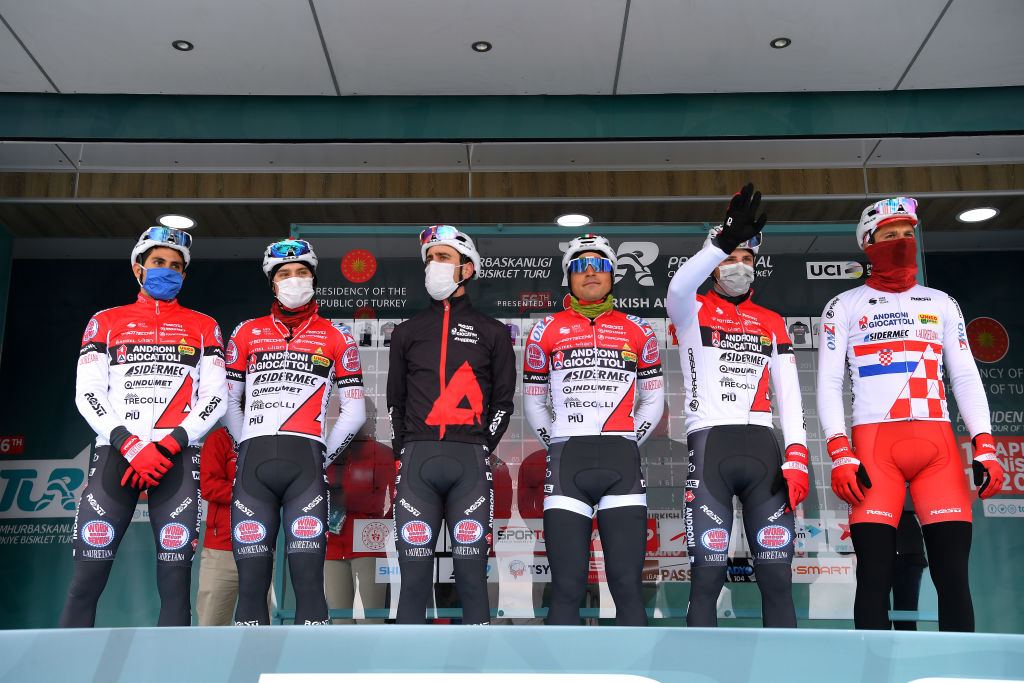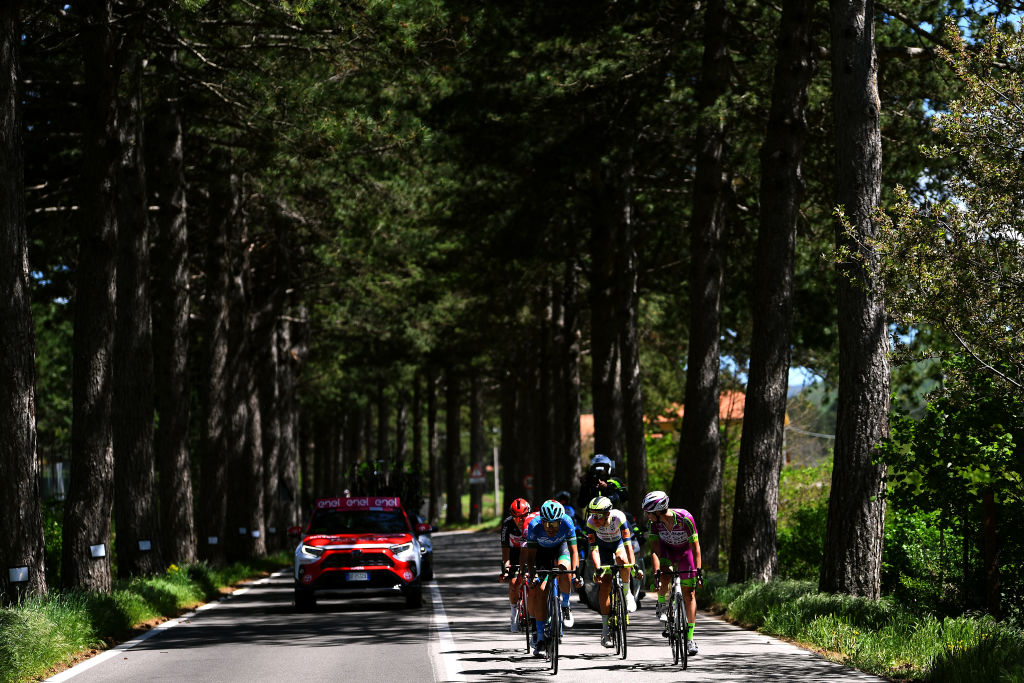Pellaud: When David beats Goliath it's always something fantastic
Androni Giocattoli-Sidermec rider on life off the front at the Giro d’Italia

A couple of kilometres outside L’Aquila on Monday afternoon, Simon Pellaud (Androni Giocattoli-Sidermec) had already assumed the usual position, a few hundred metres off the front of the Giro d’Italia peloton. There were familiar faces alongside him, too, as he climbed out of Abruzzo. Taco van der Hoorn (Intermarché-Wanty-Gobert Matériaux), Umberto Marengo (Bardiani-CSF-Faizane), Kobe Goossens (Lotto Soudal) and Samuele Rivi (Eolo-Kometa): the brotherhood of the break.
The early ascent of Sella di Corno on stage 10 gave Pellaud and his companions a chance to build up a lead, but the fast run-in to Foligno meant their bid for stage victory was almost certainly doomed. The odds were stacked against them from the outset – and losing a chunk of their lead at a level crossing only lengthened them further – but still the effort was not in vain. It never is.
Just a week previously, after all, Van der Hoorn had sprung an upset, fending off the sprinters to win by four seconds in Canale. Pellaud had been part of the day-long break that led through the Langhe and he had even been the last man standing alongside Van der Hoorn.
Ever generous in his efforts, Pellaud hadn’t the energy to follow Van der Hoorn’s acceleration on a rise near Occhetti with 9 kilometres to go, however, and he was buried in the anonymity in the group by the time the Dutchman freewheeled across the line in disbelief at his improbable victory, the eyes of the cycling world trained up on him.
Satisfaction at a win for the fraternity was tempered by disappointment that his own numbers hadn’t come up.

"I often use the expression ‘David versus Goliath’, and when David beats Goliath it’s always something fantastic, even if it hurts a bit too," Pellaud told Cyclingnews.
"I remember at 300 metres from the line hearing the speaker shouting ‘Taco van der Hoorn is going to win the stage!’ and I was back in the bunch… I didn’t even stop with my team at the finish line, I went directly to the bus. I needed a few moments to digest my disappointment a little bit, because that was really a big opportunity for me.
Get The Leadout Newsletter
The latest race content, interviews, features, reviews and expert buying guides, direct to your inbox!
"I wasted energy by sprinting for a mountain prime that was already gone. Making superfluous efforts like that cost me in the final, because I had the legs to be there with Taco and fight it out for the win. But he really rode to perfection, so I can only say hats off to the tactical and technical ability he showed."
Quarantine to the Giro
Pellaud has tried again, repeatedly, and it’s a safe bet that he will be trying all the way to Milan. Attacking seems to be hardwired into his DNA, which has probably made the 28-year-old's marriage with Androni-Sidermec these past two seasons so harmonious. Last October, Pellaud’s debut Giro ended with a visit to the podium in Milan as winner of the intermediate sprint classification, a by-product of his aggression across the three weeks.
Yet despite those displays, Pellaud and Androni-Sidermec were initially deemed surplus to requirements when the wildcard invitations for this year’s Giro were doled out in February. The Swiss rider was travelling to Europe from his off-season base in Colombia when he got word, the first deflating news of a spring that seemed only to sap morale.
"When I came back to Europe, I didn’t feel well physically. I don’t think I managed the transition from warm to cold weather very well," Pellaud said. "I don’t know if it was a virus or what, but I really suffered at Tirreno-Adriatico, and I had to take a break afterwards because I couldn’t even train.
"I think now that it was almost certainly COVID, but I don’t have exact proof of that. I started training again and just when I started feeling good once more, I went to the Tour of Turkey and I tested positive for COVID."

Pellaud had already been through plenty of hardships in his career, dating back to when IAM Cycling closed their shutters at the end of 2016. For the next three years, he raced around the globe at Continental level, from Azerbaijan to Rwanda, always for love but rarely for much money.
He also made a home for himself near Medellin, but for all his friendships and personal ties in Colombia, the initial motivation was at least partly financial. "I couldn’t afford my own place in Switzerland," he smiled.
Quarantined in a hotel in snowbound Konya last month, however, Pellaud reckoned he might have hit the lowest point of all.
"I was all alone, and it was really complicated even to speak with anyone at the hotel because of the language barrier," he said, but then three snippets of good news dropped into his inbox. Vini Zabù’s doping suspension saw their Giro wildcard reassigned to Androni-Sidermec, the Swiss national team was given a late berth at the Tour de Romandie, and Pellaud’s girlfriend secured a laissez-passer travel permit that allowed her make the trip from Colombia to Switzerland.
"That was the moment where I felt I could come back to the surface after hitting the depths," he said. "When my girlfriend and I were arranging her trip, I wasn’t expecting to ride Romandie or the Giro, so it’s a pity from that point of view, but she’s at my parents’ house in Switzerland right now. Her arrival was a big part of the turning point for me, and now that I’m on the Giro, I’m really just savouring these times. It’s a great moment in my career."
Tachira
After last year’s Giro, race director Mauro Vegni suggested that, in future, wildcard teams would have to do something more than partake in doomed breakaways to justify their invitations. Pellaud, like his manager Gianni Savio, gently rebuts the notion that Androni-Sidermec are here simply to show off their sponsors’ names on television in the early break.
"That mentality has changed, it’s not about showing the jersey anymore," Pellaud said. "I’ve changed my own way of doing things too. Last year, I lost the chance to win a stage in Asti because I went for an intermediate sprint and that put me in the red when the winning move went. We obviously have instructions from the team to be in the break, and I do my job to be up there, but in my head, it’s really the stage win that counts."
Pellaud has already won this season, a lifetime and a world away at the Vuelta al Tachira in January, when he soloed to victory on the evocative velodrome in San Cristobal, site of the 1977 World Championships.
"Do it different" is the term he uses to tag social media posts about his unconventional cycling life, and racing in Venezuela was a singular experience, on and off the bike.
"Tachira was the kind of cycling I like, there wasn’t much control and it was easier to be at the front. Here at the Giro, with an Androni jersey, it’s hard to get a position at the front of the peloton at important moments," Pellaud said. "Venezuela was also a new country for me and a new culture. It’s a country that’s been broken, a country that’s living a very difficult situation. It taught me to take even more pleasure in races like the Giro."

On the road to Foligno on Monday, Pellaud and his companions were swept up with more than 40 kilometres still to race. The Goliaths of the peloton took centre stage once again, as Egan Bernal (Ineos Grenadiers) and Remco Evenepoel (Deceuninck-QuickStep) scrapped over bonus seconds, and Peter Sagan (Bora-Hansgrohe) claimed stage victory.
The dream had died for another day, but the slingshot remains close at hand.
"We didn’t succeed today," Pellaud said at the finish, "but it’s always good to be out in front."

Barry Ryan was Head of Features at Cyclingnews. He has covered professional cycling since 2010, reporting from the Tour de France, Giro d’Italia and events from Argentina to Japan. His writing has appeared in The Independent, Procycling and Cycling Plus. He is the author of The Ascent: Sean Kelly, Stephen Roche and the Rise of Irish Cycling’s Golden Generation, published by Gill Books.